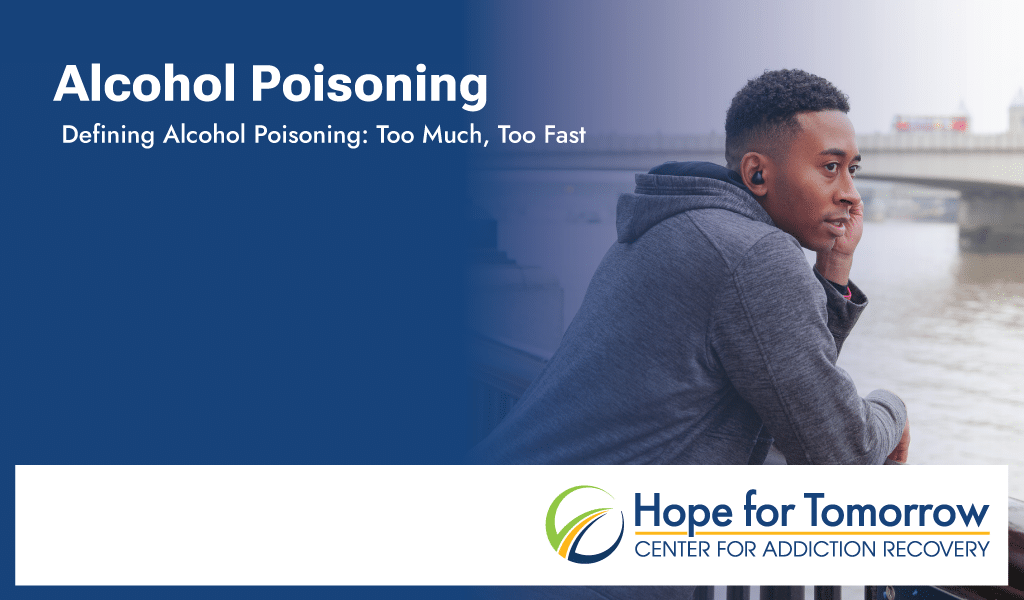

Has alcohol ever made you feel sick before? Maybe you’re sensitive to it, and just one drink gives you a headache, or a memory just surfaced of a wild night you had back in college. Maybe it’s something you experience nearly every day. Alcohol is a toxic substance, and our bodies have their ways of dealing with it that are unpleasant a lot of the time. Everyone knows the stereotype of someone who drank too much throwing up, and that’s because it happens. Throwing up due to alcohol use isn’t something to dismiss so easily, though. It can be a precursor to alcohol poisoning.
Someone with alcohol poisoning needs medical help immediately, no matter who they are. If they’ve built up a high tolerance to alcohol and are binge drinking, like 14 in every 100 West Virginians are, they’re especially at risk for alcohol poisoning. They may also have an undiagnosed alcohol use disorder. At Hope for Tomorrow, we’ve worked with people whose alcohol poisoning set them on the road to recovery. Before seeking recovery from an alcohol use disorder, the person with alcohol poisoning needs emergency medical attention. Here’s everything you need to know to help them get it.
Alcohol poisoning, or alcohol overdose, happens when you drink more alcohol than your body can handle in a short amount of time. Your blood alcohol concentration (BAC) gets so high that it starts interfering with your body and brain’s functioning. How much alcohol it takes to overdose depends on each person, but generally a .30% BAC or higher causes alcohol poisoning. Alcohol poisoning is serious and can be deadly, especially without immediate action.
It can be difficult to recognize whether someone is intoxicated at a safe level or at risk for alcohol poisoning, but there are important symptoms that differentiate between the two. You don’t need to experience all of the symptoms to have alcohol poisoning, so make sure to get help if you see any of the following:

Binge drinking is the most common cause of alcohol poisoning. The Centers for Disease Control and Prevention (CDC) says binge drinking is anything that brings a person’s BAC to .08 or higher. This ends up being about five drinks for men every two hours and four drinks every two hours for women.
An alcohol overdose is also far more possible if you drink alcohol while taking certain medications, such as benzodiazepines or opioids. Mixing these substances can change the effect of each substance.
Sometimes people, especially children, will get alcohol poisoning from consuming alcohol-containing products like mouthwash, medication, and household cleaners. While rare, this is also a serious concern.
The most obvious signs of alcohol poisoning to anyone, including physicians, are the outward ones listed previously. This is part of the diagnosis, and doctors will likely order blood or urine tests to check BAC and confirm alcohol poisoning is the culprit for the symptoms.
The most obvious risk of alcohol poisoning is death. If your BAC reaches a high enough level, your body can shut down entirely. BAC between .6% and .8% is usually lethal. Without immediate medical attention, a person with alcohol poisoning’s life is at risk.
While some people fall unconscious due to alcohol poisoning, they may also vomit. They can do this even while unconscious, which can cause them to choke on their vomit. This can also cause death or brain damage. Alcohol is a diuretic, which causes the body to lose fluids. That combined with any vomiting makes dehydration even more likely.
Those most at risk of alcohol poisoning typically binge drink, and binge drinking comes with its health complications. Liver disease is common in those who binge drink frequently, and alcohol is also linked with some cancers. Accidents are also possible when highly intoxicated, especially if the individual tries to drive.
If you suspect someone has alcohol poisoning, the most important thing to do is call 911 right away. It doesn’t matter the situation. Alcohol poisoning is life-threatening, and saving a life is more important than any trouble anyone could get into.
Once you call for medical attention, someone needs to stay with the person you suspect has alcohol poisoning. Try to keep the person in an upright position to prevent any choking, and if they need to lie down, make sure they’re lying on their side.
You’ll also want as much information about the situation as possible. Find out how much alcohol the person drank, the kind of alcohol they drank, any medications they’re on, any allergies they have, and any medical conditions they have. The more information you can provide to medical personnel when they arrive, the better they’ll be able to treat the person with alcohol poisoning.
The best way to prevent alcohol poisoning is by not drinking in the first place, but that’s easier said than done for many people. The next best thing is to avoid binge drinking and stick to healthy amounts of alcohol instead. The 2020-2025 Dietary Guidelines for Americans suggest two or fewer drinks in one day per men, and one or fewer drinks in one day for women. It also says abstaining from drinking altogether is ideal. If you do drink, don’t drink on an empty stomach. It can help slow down alcohol absorption a little, but eating beforehand still doesn’t make binge drinking safe.
You should also make sure you’re familiar with your medications, and whether they interact with alcohol or not. Some medications and alcohol are dangerous when mixed, and if you’re on one of the medications in question, it’s best to avoid alcohol altogether or drink very little.
To avoid alcohol poisoning due to accidents, make sure to store all alcohol and household substances with alcohol safely to avoid any children getting into them.
Treatment for alcohol poisoning will involve stabilization in an emergency setting, where the person with alcohol poisoning will be monitored closely. Often, healthcare providers will give the person IV fluids to help combat dehydration and level out blood sugar. Those experiencing trouble breathing due to alcohol poisoning may receive oxygen therapy. Stomach pumping is rare and usually only used in the case of very recent extreme alcohol consumption, or when consumption of other substances is suspected.
Once the alcohol has successfully left the person’s system, the medical staff may assess them for a potential alcohol use disorder.

Now you know how to spot the signs of alcohol poisoning, and how to help people with it. What if you’re the person worried about getting alcohol poisoning, though? What if you’ve lived through alcohol poisoning and are still having a hard time stopping drinking? You are likely living with an alcohol use disorder, and it’s not too late to get help. It may be time to look for an alcohol rehab. Seeking treatment for your alcohol use disorder is the best way to ensure you’re never at risk for alcohol poisoning, or any other health concerns that come with prolonged alcohol use, ever again.
Hope for Tomorrow is a substance use treatment center in West Virginia. We focus on bringing care to everyone who needs it. No matter what walk of life you come from, and what you’ve been through, you’re welcome here. We treat veterans, pregnant women, couples, those with medical conditions, and everyone in between. To start your journey toward recovery, give us a call at 877-679-8162. Treatment today for a brighter tomorrow.
What should I eat after alcohol poisoning?
The most important thing to do when you have alcohol poisoning is to seek medical attention. The medical staff will help you through the process until the alcohol leaves your system. By then, it doesn’t matter what you eat. Staying hydrated is recommended, though.